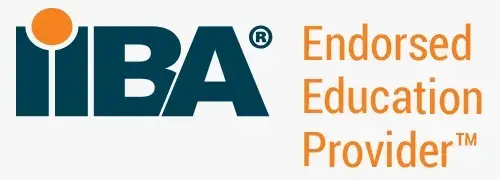This article introduces the Business Analysis Body of Knowledge (BABOK) Guide. BABOK guide is the official guide for all IIBA Business Analysis certification exams – CBAP, CCBA and ECBA. It is a comprehensive guide for understanding the Business Analysis practice.
The BABOK Guide can drive business results and career advancement for business analysis professionals. It describes both the mentality and the actions that will assist you in using continuous feedback and quick learning to prioritize delivery, minimize waste, achieve better business outcomes, and maximize the value delivered.
BABOK should be considered as a best practice guide to drive the business analysis activities.
BABOK guide – Quick facts
Here are some quick facts about the BABOK guide:
| BABOK v3 Elements |
Count |
| Number of pages |
514 |
| Knowledge Areas |
6 |
| Tasks |
30 |
| Underlying Competencies |
6/29 |
| Techniques |
50 |
| Perspectives |
5 |
Key Concepts in The BABOK Guide
The BABOK Guide describes several key concepts. These concepts are used throughout the guide to explain Business analysis activities and practice. These key concepts are:
- Needs represents the expectations of the client
- Change defines the initiative
- Solution solves the needs of the client
- Stakeholders must work towards a common goal
- Right solution helps the client get the expected value
- Every project initiative may have different context and that makes a project unique
- The business analysis practice is encapsulated in six knowledge areas. Each knowledge area is divided into tasks
- Business Analysts use techniques to perform a task
- The competencies help perform a task more efficiently.
BABOK Guide Architecture
What is the architecture of the BABOK® Guide? The guide comprises five essential elements. These elements are:
![BABOK-Guide-Architecture]()
Business Analysis Body of Knowledge – Essential Elements
Let’s look at each of these elements.
Core Concepts
Core Concepts are fundamental to the practice of business analysis as defined in the Business Analysis body of knowledge (BABOK) Guide. The Business Analysis practice, as described in the BABOK Guide, is based on these Core Concepts and is part of the Business Analysis Core Concepts Model (BACCM).
Knowledge Areas & Tasks
The Business Analysis practice has been divided into six Knowledge Areas. These Knowledge Areas cover the business analysis practice. Each of these Knowledge Areas is further divided into tasks and elements.
The six knowledge areas are:
- Business Analysis planning and monitoring
- Elicitation and Collaboration
- Requirements Analysis and design definition
- Requirements lifecycle Management
- Strategy Analysis
- Solution Evaluation
Each knowledge area has been described using a standard structure as shown below:
![Knowledge-Areas-and-Tasks]()
Underlying Competencies
As per BABOK Guide, the Underlying Competencies chapter describes the behaviors, characteristics, knowledge, and personal qualities that support the practice of Business Analysis. The Competencies defined in the guide are generic Competencies and applicable to other professional areas.
The Competencies have been divided into 6 categories: analytical thinking and problem solving, communication skills, interaction skills, etc. As you can make out, these competencies may apply to other professional areas.
Techniques
The BABOK guide enlists techniques for each of the tasks under knowledge areas. A Business Analyst can use these Techniques to accomplish the tasks. The guide has picked up the most used and common techniques. Business Analysts apply their experience and judgment in determining which techniques are appropriate to a given situation.
Perspectives
Perspectives are one of the core concepts, which focuses on the Business Analysis activity for each project. For example, AGILE is one of the perspectives indicating that the Business Analysis activities have to be applied and used with AGILE perspective rather than a traditional project perspective.
BABOK Knowledge Areas
Knowledge areas are key to the BABOK Guide. Each knowledge areas describes the activities and best practices for Business Analysts.
Here is a brief description of these knowledge areas:
Business Analysis Planning and Monitoring
This knowledge area describes the planning approach, methodology, and governance process for business analysis activities. It also describes how business analysis performance of business analysts can be improved. Tasks of this knowledge area produce outputs that are guidelines to other knowledge area tasks.
Elicitation and Collaboration
This knowledge area describes the tasks for discovering information to understand a change through direct or indirect techniques. This also includes tasks to confirm the gathered information with the stakeholders. It’s not a phase but an ongoing activity.
Requirements lifecycle Management
This knowledge area includes activities associated with complete life cycle of requirements, from inception to retirement. RLCM begins with the representation of a business need as a requirement and continues through the development of a solution & ends when a solution & the requirement that represent it, are retired.
Strategy Analysis
Strategy analysis is the discovery and definition of transitions to achieve the end considering the means.
Means here refers to the current state, Ends refers to the future state and the discovery or definitions of transitions is in the change strategy, which also includes the risks.
The tasks of strategy analysis represent the activities, which need to be carried out to achieve the desired future state.
Requirements Analysis and Design Definition
This Knowledge Area deals with the tasks used for transforming needs into Solution. These tasks are iterative and incremental in nature.
Solution Evaluation
This knowledge area describes the activities to assess the performance of a solution and the value delivered by the solution. These activities are carried out by a Business Analyst. This knowledge area also describes the tasks to measure, analyze and take corrective actions to overcome the barriers so that desired value can be achieved.
Conclusion
It is critical to Master BABOK if you want to succeed in the IIBA Certification examinations like CBAP, CCBA and ECBA. Our IIBA Certification preparation courses help you master BABOK and practice with mock questions. Our CBAP Training, CCBA Training and ECBA Training include in-depth discussions of knowledge areas and tasks with real-life examples.



